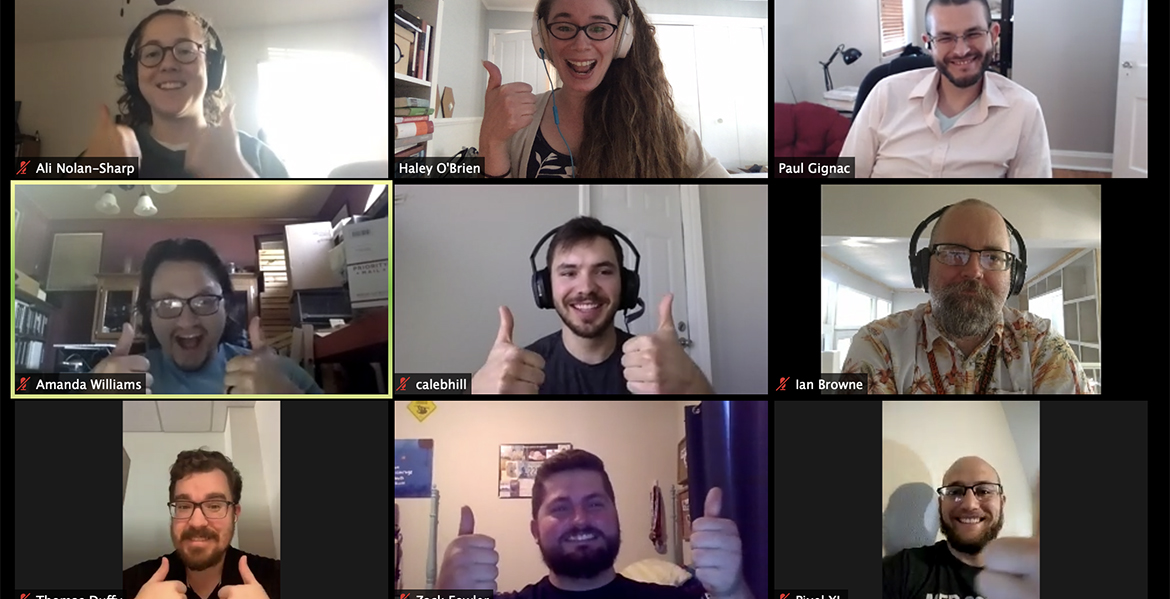
Remote research elective developed in response to COVID-19 shut down
Thursday, June 25, 2020
There’s not much on the OSU Center for Health Sciences campus that hasn’t been affected by the COVID-19 pandemic including rotations for medical students.
That’s when Dr. Haley O’Brien, Ph.D., assistant professor in the Department of Anatomy and Cell Biology, came up with the idea of a remote research elective studying 3D medical imaging and its accuracy.
“My research as an anatomist is almost all done on computers, typically making 3D models from imaging studies like CT scans and MRIs. When I heard that students were being displaced from in-person rotations, I wanted to develop an opportunity for students to learn a new, practical radiology-relevant skill,” O’Brien said.
The project started in May and six students signed up for the month-long elective looking into different ways to make 3D medical imaging more accurate.
“As CT and MRI become more advanced, and as new software is developed to interpret scans, there is an increased demand for radiologists and technicians who can build 3D models of different brain regions or even pathologies like tumors,” she said. “These 3D models can be examined on the computer or even 3D printed so that physicians can track progressive diseases like neurodegenerative disorders, or plan for complicated surgeries like tumor extraction.”
The students compared two different methods of building 3D models of putamen, a brain region involved in motor planning that is often affected by Parkinson’s disease. They found digitally increasing the resolution of MRIs significantly improved the accuracy of model building.
Thomas Duffy, a fourth-year medical student, was one of the students who signed up for the elective.
“I took part because I believed research would make me a more competitive residency applicant, and a better understanding of imaging modalities would make me a better practitioner,” Duffy said. “I learned that 3D imaging accuracy can have extremely uniform interpretation even across multiple users. The lessons we learned about the technology behind 3D imaging made me excited to see what new tools will develop during my career.”
O’Brien said she has wanted to put together a short course on 3D medical imaging but never found the right time. With assistance from Assistant Dean of Clinical Education Dr. Christopher Thurman, D.O.; Interim Associate Dean of Curriculum Dr. Randy Wymore, Ph.D.; and Director of the Office for Medical Student Research Dr. Matt Vassar, Ph.D., she was able to put this remote research project together.
"For the students, I think having the opportunity to learn some pretty sophisticated software remotely, from the comfort of their homes, was a great benefit. It would have been nice to meet in person, but the students adapted so well to virtual meetings and troubleshooting."
Duffy agrees, and said doing this kind of research remotely was ideal for the situation.
“I was able to be in a comfortable space, use equipment I was familiar with, and work at my own pace to meet our goals. Distance collaboration was second nature to our research group, who were all very comfortable using multiple platforms for on-demand communication. Filesharing and video conferencing made the research much more efficient,” he said. “The only drawback was not being able to learn with a professor over your shoulder showing you how to use the technology or with peers side-by-side teaching each other.”
Primary research is never easy, O’Brien said, but the hard work and dedication of the medical students made research in this unique circumstance easier than she anticipated.
“I'm so impressed with their professionalism, motivation and eagerness to learn, especially in light of the uncertainty and upheaval to their schedules and routines that they were going through due to COVID-19,” she said. “I'm really proud of the hard work and thoughtfulness that the student researchers brought with them every day. They helped each other learn and succeed. This is a challenging time for everyone, but these young people are rising to the occasion.”
MEDIA CONTACT: Sara Plummer | Communications Coordinator | 918-561-1282 | sara.plummer@okstate.edu
